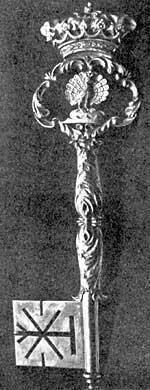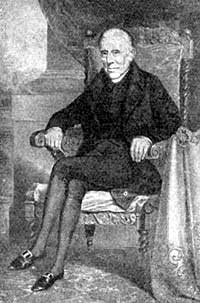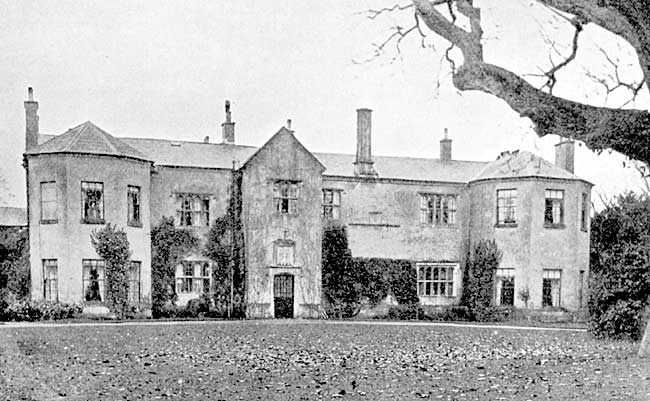
The key to the Staunton Tower at Belvoir Castle, reproduced by kind permission of His Grace The Duke of Rutland.
Job Staunton Charlton, when he came of age, found his property encumbered to the amount of over £6,000, but marrying Mary, daughter of Daniel Greenwood, of Northampton, she brought to him a considerable share of the property which her mother inherited from the
Dands of Mansfield Woodhouse, as well as a great collection of deeds relating to lands in Mansfield Woodhouse and that locality.
Job Staunton Charlton represented Newark in Parliament from 1741 to 1761. He held high office in the Ordnance department, finally retiring with a pension of £500 per annum, charged upon the revenues of Ireland.
Most of his correspondence has been preserved, and is worthy of being edited separately. Newark at that time was a pocket borough of the Duke of Newcastle, who aspired to control other seats in the county as well, but Lord Middleton and the Duke of Rutland were not without their influence also and, as his letters show, Job Staunton Charlton so manoeuvred that, politically speaking, Clumber, Wollaton, and Belvoir never knew whether they were standing on their heads or their heels so far as the member for Newark was concerned.
A list of his benefactions in Newark shows that they were judicious; widows getting half-a-crown per week.
The Mayor and Corporation, perhaps anxious to show on which side they intended to vote, presented him with the Freedom of the Borough, during the course of a contested election. How much more interesting elections would be if such things were done nowadays.
The following letter addressed to him shows the terms on which Job Staunton Charlton commenced his political career.
London,
4 May, 1732.
Dr Sr
I was this morning at Lord Howe's who seemed clear of the opinion that Sir R Sutton would be this day expelled the House of Commons upon account of the Charitable Corporation, and that his being made Governor of Barbadoes would be declared, so that their would want two new Representatives for our County. I give you this hint that you may not be surprised if you should have a letter from the Duke of Newcastle to desire you would stand without your being at one farthing's expense, which in my humble opinion would be a very favourable opportunity of your making your fortune as I entirely hope it will.
I think it might be very proper if you intend to accept of the offer to take a trip to Lord Middleton who I dare say has that regard for you that he would either give you his interest, or at least stand neuter, either of which would prevent an opposition. It is now 9 o'clock and the house is sitting upon Sir R Sutton's defence but the report is so strong against him that I don't hear anybody but what is of Ld Howe's opinion. Ld Howe is very desirous that you should embrace this opportunity and he is resolved to come down on purpose to serve you to the utmost of his power. There is no talk of an opposition but this you will certainly know of Ld Middleton. I hope you will excuse this and take it as it is meant, which I assure you is out of the sincere value and Friendship I have for you, and also beg leave to assure you that no one has a more hearty zeal for your welfare than Dr Sr your most
obliged and very humble
Sert to Command
Edward Pole.
I beg you will favour me with a line direct to me at George's Coffee house upper end of the Haymarket and I will communicate the contents to Ld Howe. The other I believe will be Mr Thorney or Mr Mellish. I told Ld Howe this morning that I was sure you would stand upon no other terms than having all your expenses born.
Two letters from Newcastle House are interesting as showing the struggle between Clumber and Wollaton for a predominating position in the county.
Newcastle House,
June 10th, 1747.
Dear Sir,
I cannot sufficiently express my surprise and concern at the Message you received from my Lord Middleton, by Mr. Brough.
The inclosed Copies of Letters, which I have sent away, will shew you how extremely ill founded My Lord Middleton's Suspicions are.
I must beg you would take the first Opportunity to talk to Lord Middleton on this Subject and shew him (notwithstanding all the Difficulties which he must be sensible I meet with,) What Proofs I give of my Inclination to live with Him upon the most friendly Foot; and indeed I cannot but lament my own ill Fortune, who am accused by the Howe Family of endeavouring to drive them out of the County and Town; and am at the same time suspected by My Lord Middleton of having, underhand, countenanced this Opposition.
I hope to hear from you every Post .... Holles Newcastle.
Mr. Charlton.
From the Duchess of Newcastle.
Newcastle House,
April ye 5th 1761.
Dear Sr.
I never in my life was more Surpris'd than at the reading of your letter. Some very wicked ill designing people must have invented all those Lyes that have been told you about the Duke of Newcastle. He desires to See you on Wensday Morning at nineo clock, (which is the first hour he could appoint, since I receiv'd yr Letter) he went into Sussex Yesterday, and returns to Town next Tuesday. As to the Chair Money, it is so farr from what you was told that he desires me to let you know that he will inform himself whether it is Customary in a new Reign to have that Sum doubled, or, that if the late Speaker, Mr. Onslow, will say, it should be so, that it Shall be so to you: by this you will see how falsely things have been represented to you; and that however much the Duke of Newcastle might be hurt and Surpris'd that you could not use yr Interest for Him at Newark, yet that he did not carry his Resentment to any length. I am allways griev'd when anything happens to occasion any Coolness between old friends. Wherefore you may be Sure I am very much so in this Instance; and you must give me leave to Say that I own my Self greatly Astonish'd that you could for a Son of the late Lord Middleton's withold yr Interest from the Duke of Newcastle. I hope I may live to See all this sett right again, and am
Dear Sr, your very faithfull
Humble Servant.
H. Newcastle.
If Job Staunton Charlton did not make his fortune in Parliament, at any rate he much improved his financial position, and left a comfortable inheritance to each of the three daughters who succeeded him, in 1778.
These three ladies lived at Staunton Hall and all died unmarried. Their coachman who survived them described them as "old devils," and indeed they displayed a good deal of asperity in exercising their prerogatives as Ladies of the Manor of Staunton, Staunton Haverholme, and Flawborough. This last they claimed against the Duke of Newcastle who owned the land there. He treated them with unfailing courtesy while never acknowledging that they had any right on their side. And when they sent their gamekeeper to shoot over Flawborough, he contented himself with instructing his tenants there to turn the keeper off the land.
When the Grantham to Nottingham Canal was projected, the Misses Charlton opposed the Act of Parliament with all their power. The Doomsday Book mentions a water mill at Staunton, and this existed until about 1854, and a painting shows it then possessed a Norman doorway. The Duke of Rutland, who strongly supported the Canal Act because he desired to get coal cheaply to Belvoir, proposed to impound the water from the River Devon on which the Staunton Water Mill stood to supply the canal. As the Misses Charlton had already offended the Duke of Newcastle, and now were opposing their neighbour, the Duke of Rutland, they fell back on Lord Sheffield whom they petitioned to oppose the Act in the House of Lords. In the end their rights were safeguarded by a special clause in the Act; but nevertheless, the volume of water flowing past Staunton has sensibly been diminished since that day, and this accounts for the removal of the Water Mill by George William Malger Staunton at the date above mentioned.
Anne, the eldest, and last surviving of the "old devils," died in 1807. During her lifetime she repurchased from Lord Bessborough all that part of the Manor of Staunton which had been lost through the Civil War, and thus was able on her death to bequeath to her cousin, Elizabeth Brough, this Manor entire, while she left her Carlton Scroop estate to Elizabeth Brough's eldest sister as some recompense for being passed over. Anne Charlton made great alterations at Staunton Hall, and her accounts and letters show that she was engaged in constant disputes with the builder, being warmly supported by all of her relatives who had expectations, and who professed themselves horrified that this tradesman should expect to be paid what had been bargained.
She covered the whole of the outside of the Hall with stucco—now happily removed—at a cost of £75, which seems a reasonable price for spoiling the appearance of this interesting house, and in short, she seems to have done as much to modernize the place as though she had lived fifty years later. Her work, however, had the great merit of being solid and lasting.

Rev. John Staunton, LL.D. (from the portrait by W. H. Cubley).
Anne Charlton died in 1807 and, as has been stated, left the Staunton Estate to her cousin, Elizabeth Brough (who had married Rev. John Aspenshaw, LL.D.) on condition that she, her husband, and their successors should take the name and bear the arms of Staunton only.
Dr. Staunton, as he then became, was a pluralist of a type now happily extinct. Rector of St. Peter's, Nottingham from 1797 to 1814, he also held from 1804 to 1813 the livings of Hinckley, Stoke Golding and Dadlington, in Leicestershire. Resigning these, he became Rector of Elton on the Hill in 1813, and also Rector of Kilvington in the same year, and added to these the living of Staunton with Flawborough when it fell vacant in 1828. While he may have had to leave his Leicestershire parishes very much to the ministrations of his not too highly paid curates, he certainly never neglected his Nottinghamshire ones, as his note books and sermons show. In his 77th year he set to work and rebuilt Flawborough Church from the ground, mostly at his own expense, and he was always generous in his support of any worthy cause.
For many years he was Chairman of Quarter Sessions at Newark, and in 1844 his friends presented him with a portrait of himself painted by W. H. Cubley. He died in 1851, and was succeeded in turn by his grandsons, George William Malger, Henry Charlton and Francis, the last—the only one who married—leaving the Staunton estate to the present owner.

Staunton Hall—the North-west front.

